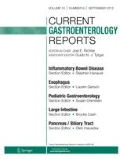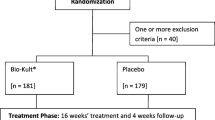Abstract
A rationale for the use of probiotics for a number of functional gastrointestinal symptoms and syndromes can be developed, and an experimental basis for their use continues to emerge, but data from well-conducted clinical trials of probiotics in this area remain scarce. Irritable bowel syndrome (IBS) has attracted the most attention; recent revelations regarding the potential pathogenic roles of the enteric flora and immune activation have led to reawakened interest in bacteriotherapy for this common and challenging disorder. Some recent randomized, controlled studies attest to the efficacy of some probiotics in alleviating individual IBS symptoms, and selected strains have a more global impact. Evidence for long-term efficacy is also beginning to emerge, though more studies are needed in this regard. In other functional syndromes, data are far from adequate to make recommendations, but there is evidence for efficacy of probiotics in treating individual symptoms such as diarrhea, constipation, and bloating. The interpretation of much of the literature in this area is complicated by lack of quality control, use of many different species and strains, and, above all, significant deficiencies in trial methodology.
Similar content being viewed by others
References and Recommended Reading
Falk PG, Hooper LV, Mittvedt T, Gordon JI: Creating and maintaining the gastrointestinal ecosystem: what we know and need to know from gnotobiology. Microbiol Mol Biol Rev 1998, 62:1157–1170.
Shanahan F: The host-microbe interface within the gut. Best Pract Res Clin Gastroenterol 2002, 16:915–931.
O’Hara AM, Shanahan F: Gut microbiota: mining for therapeutic potential. Clin Gastroenterol Hepatol 2007, 5:274–284.
Guarner F, Malagelada JR: Gut flora in health and disease. Lancet 2003, 361:512–519.
Rachmilewitz D, Katakura K, Karmeli F, et al.: Toll-like receptor 9 signaling mediates the anti-inflammatory effects of probiotics in murine experimental colitis. Gastroenterology 2004, 126:520–528.
Shanahan F: Probiotics: a perspective on problems and pitfalls. Scand J Gastroenterol 2003, 38(suppl):34–36.
Isolauri E, Salminen S, Ouwehand AC: Microbial-gut interactions in health and disease. Probiotics. Best Pract Res Clin Gastroenterol 2004, 18:299–313.
NASPGHAN Nutrition Report Committee, Michail S, Sylvester F, et al.: Clinical efficacy of probiotics: review of the evidence with focus on children. J Pediatr Gastroenterol Nutr 2006, 43:550–557.
Quigley EM: Bacterial flora in irritable bowel syndrome: role in pathophysiology, implications for management. J Dig Dis 2007, 8:2–7.
Thabane M, Kottachchi DT, Marshall JK: Systematic review and meta-analysis: the incidence and prognosis of post-infectious irritable bowel syndrome. Aliment Pharmacol Ther 2007, 26:535–544.
Marshall JK, Thabane M, Borgaonkar MR, James C: Postinfectious irritable bowel syndrome after a food-borne outbreak of acute gastroenteritis attributed to a viral pathogen. Clin Gastroenterol Hepatol 2007, 5:457–460.
Gwee K-A, Leong Y-L, Graham C, et al.: The role of psychological and biological factors in post-infective gut dysfunction. Gut 1999, 44:400–406.
Dunlop SP, Jenkins D, Neal KR, Spiller RC: Relative importance of enterochromaffin cell hyperplasia, anxiety, and depression in postinfectious IBS. Gastroenterology 2003, 125:1651–1659.
Spiller RC, Jenkins D, Thornley JP, et al.: Increased rectal mucosal enteroendocrine cells, T lymphocytes, and increased gut permeability following acute Campylobacter enteritis and in post-dysenteric irritable bowel syndrome. Gut 2000, 47:804–811.
Gwee K-A, Collins SM, Read NW, et al.: Increased rectal mucosal expression of interleukin 1 beta in recently acquired post-infectious irritable bowel syndrome. Gut 2003, 52:523–526.
Quigley EM: Bacteria: a new player in gastrointestinal motility disorders—infections, bacterial overgrowth and probiotics. Gastroenterol Clin N Am 2007, 36:735–748.
Chadwick V, Chen W, Shu D, et al.: Activation of the mucosal immune system in irritable bowel syndrome. Gastroenterology 2002, 122:1778–1783.
Barbara G, Wang B, Stanghellini V, et al.: Mast cell-dependent excitation of visceral-nociceptive sensory neurons in irritable bowel syndrome. Gastroenterology 2007, 132:26–37.
Cenac N, Andrews CN, Holzhausen M, et al.: Role for protease activity in visceral pain in irritable bowel syndrome. J Clin Invest 2007, 117:636–647.
O’Mahony L, McCarthy J, Kelly P, et al.: A randomized, placebo-controlled, double-blind comparison of the probiotic bacteria lactobacillus and bifidobacterium in irritable bowel syndrome (IBS): symptom responses and relationship to cytokine profiles. Gastroenterology 2005, 128:541–551.
Liebregts T, Adam B, Bredack C, et al.: Immune activation in patients with irritable bowel syndrome. Gastroenterology 2007, 132:913–920.
Dinan TG, Quigley EM, Ahmed SM, et al.: Hypothalamic-pituitary-gut axis dysregulation in irritable bowel syndrome: plasma cytokines as a potential biomarker? Gastroenterology 2006, 130:304–311.
Kassinen A, Krogius-Kurikka L, Mäkivuokko H, et al.: The fecal microbiota of irritable bowel syndrome patients differs significantly from that of healthy subjects. Gastroenterology 2007, 133:24–33.
Shanahan F: Irritable bowel syndrome: shifting the focus toward the gut microbiota. Gastroenterology 2007, 133:340–342.
Quigley EMM: A 51-year-old with IBS. Test or treat for bacterial overgrowth? Clin Gastroenterol Hepatol 2007, 5:1140–1143.
Posserud I, Stotzer PO, Bjornsson E, et al.: Small intestinal bacterial overgrowth in patients with irritable bowel syndrome. Gut 2007, 56:802–808.
Bratten JR, Spanier J, Jones MP: Lactulose breath testing does not discriminate patients with irritable bowel syndrome from healthy controls. Am J Gastroenterol 2008, 103:958–963.
Quigley EMM, Flourie B: Probiotics in irritable bowel syndrome: a rationale for their use and an assessment of the evidence to date. Neurogastroenterol Motil 2007, 19:166–172.
Niedzielin K, Kordecki H, Birkenfeld B: A controlled, double-blind, randomized study on the efficacy of Lactobacillus plantarum 299V in patients with irritable bowel syndrome. Eur J Gastroenterol Hepatol 2001, 13:1143–1147.
Kim HJ, Camilleri M, McKinzie S, et al.: A randomized controlled trial of a probiotic, VSL#3, on gut transit and symptoms in diarrhoea-predominant irritable bowel syndrome. Aliment Pharmacol Ther 2003, 17:895–904.
Kim HJ, Vazquez Roque MI, Camilleri M, et al.: A randomized controlled trial of probiotic combination VSL#3 and placebo in irritable bowel syndrome with bloating. Neurogastroenterol Motil 2005, 17:687–696.
Kajander K, Hatakka K, Poussa T, et al.: A probiotic mixture alleviates symptoms in irritable bowel syndrome patients: a controlled 6-month intervention. Aliment Pharmacol Ther 2005, 22:387–394.
Sinn DH, Song JH, Kim HJ, et al.: Therapeutic effect of Lactobacillus acidophilus-SDC 2012, 2013 in patients with irritable bowel syndrome. Dig Dis Sci 2008 Feb 15 (Epub ahead of print).
Guyonnet D, Chassany O, Ducrotte P, et al.: Effect of a fermented milk containing Bifidobacterium animalis DN-173 010 on the health-related quality of life and symptoms in irritable bowel syndrome in adults in primary care: a multicentre, randomized, double-blind, controlled trial. Aliment Pharmacol Ther 2007, 26:475–486.
Whorwell PJ, Altinger L, Morel J, et al.: Efficacy of an encapsulated probiotic Bifidobacterium infantis 35624 in women with irritable bowel syndrome. Am J Gastroenterol 2006, 101:1581–1590.
Kajander K, Myllyluoma E, Rajilic-Stojanovic M, et al.: Clinical trial: multispecies probiotic supplementation alleviates the symptoms of irritable bowel syndrome and stabilizes intestinal microbiota. Aliment Pharmacol Ther 2008, 27:48–57.
Kajander K, Krogius-Kurikka L, Rinttilä T, et al.: Effects of multispecies probiotic supplementation on intestinal microbiota in irritable bowel syndrome. Aliment Pharmacol Ther 2007, 26:463–473.
Bittner AC, Croffut RM, Stranahan MC, Yokelson TN: Prescript-assist probiotic-prebiotic treatment for irritable bowel syndrome: an open-label, partially controlled, 1-year extension of a previously published controlled clinical trial. Clin Ther 2007, 29:1153–1160.
Verdu EF, Bercik P, Verma-Gandhu M, et al.: Specific probiotic therapy attenuates antibiotic induced visceral hypersensitivity in mice. Gut 2006, 55:182–190.
Bueno L, de Ponti F, Fried M, et al.: Serotonergic and non-serotonergic targets in the pharmacotherapy of visceral hypersensitivity. Neurogastroenterol Motil 2007, 19(1 Suppl):89–119.
Rousseaux C, Thuru X, Gelot A, et al.: Lactobacillus acidophilus modulates intestinal pain and induces opioid and cannabinoid receptors. Nature Med 2007, 13:35–37.
Gareau MG, Jury J, MacQueen G, et al.: Probiotic treatment of rat pups normalises corticosterone release and ameliorates colonic dysfunction induced by maternal separation. Gut 2007, 56:1522–1528.
Duncker SC, Wang L, Hols P, Bienenstock J: The d-alanine content of lipoteichoic acid is crucial for Lactobacillus plantarum-mediated protection from visceral pain perception in a rat colorectal distension model. Neurogastroenterol Motil 2008 Feb 25 (Epub ahead of print).
Wilhelm SM, Brubaker CM, Varcak EA, Kale-Pradhan PB: Effectiveness of probiotics in the treatment of irritable bowel syndrome. Pharmacotherapy 2008, 28:496–505.
Allen SJ, Okoko B, Martinez E, et al.: Probiotics for treating infectious diarrhoea. Cochrane Database Syst Rev 2004, (2):CD003048.
Urbancsek H, Kazar T, Mezes I, et al.: Results of a double-blind, randomized study to evaluate the efficacy and safety of Antibiophilus in patients with radiation-induced diarrhea. Eur J Gastroenterol Hepatol 2003, 13:391–396.
Delia P, Sansotta G, Donato V, et al.: Use of probiotics for prevention of radiation-induced diarrhea. World J Gastroenterol 2007, 13:912–915.
McFarland LV: Meta-analysis of probiotics for the prevention of traveler’s diarrhea. Travel Med Infect Dis 2007, 5:97–105.
Szajewska H, Skorka A, Dylag M: Meta-analysis: Saccharomyces boulardii for treating acute diarrhoea in children. Aliment Pharmacol Ther 2007, 25:257–264.
D’souza AL, Rajkumar CH, Cooke J, et al.: Probiotics in prevention of antibiotic associated diarrhea: meta-analysis. BMJ 2002, 324:1361–1366.
Ahuja MC, Khamar B: Antibiotic associated diarrhea: a controlled study comparing plain antibiotic with those containing protected lactobacilli. J Indian Med Assoc 2002, 100:334–335.
Sazawal S, Hiremath G, Dhingra U, et al.: Efficacy of probiotics in prevention of acute diarrhoea: a meta-analysis of masked, randomised, placebo-controlled trials. Lancet Infect Dis 2006, 6:374–382.
de Vrese M, Marteau PR: Probiotics and prebiotics: effects on diarrhea. J Nutr 2007, 137(3 Suppl 2):803S–811S.
Koebnick C, Wagner I, Leitzmann P, et al.: Probiotic beverage containing Lactobacillus casei Shirota improves gastrointestinal symptoms in patients with chronic constipation. Can J Gastroenterol 2003, 17:655–659.
Amenta M, Cascio MT, Di Fiore P, Venturini I: Diet and chronic constipation. Benefits of oral supplementation with symbiotic zir fos (Bifidobacterium longum W11 + FOS Actilight). Acta Biomed 2006, 77:157–162.
Banaszkiewicz A, Szajewska H: Ineffectiveness of Lactobacillus GG as an adjunct to lactulose for the treatment of constipation in children: a double-blind, placebo-controlled randomized trial. J Pediatr 2005, 146:364–369.
Ouwehand AC, Lagstrom H, Suomalainen T, Salminen S: Effect of probiotics on constipation, fecal azoreductase activity and fecal mucin content in the elderly. Ann Nutr Metab 2002, 46:159–162.
Borody TJ, Warren EF, Leis SM, et al.: Bacteriotherapy using fecal flora: toying with human motions. J Clin Gastroenterol 2004, 38:475–483.
Picard C, Fioramonti J, Francois A, et al.: Review article: bifidobacteria as probiotic agents—physiological effects and clinical benefits. Aliment Pharmacol Ther 2005, 22:495–512.
Khalif IL, Konovitch EA, Maximova ID, Quigley EMM: Alterations in the colonic flora and intestinal permeability and evidence of immune activation in chronic constipation. Dig Liver Dis 2005, 37:838–849.
Quigley EM: Germs, gas and the gut; the evolving role of the enteric flora in IBS. Am J Gastroenterol 2006, 101:334–335.
Kim L, Hilli L, Orlowski J, et al.: Efficacy of probiotics and nutrients in functional gastrointestinal disorders: a preliminary clinical trial. Dig Dis Sci 2006, 51:2134–2144.
Duman DG, Bor S, Ozütemiz O, et al.: Efficacy and safety of Saccharomyces boulardii in prevention of antibiotic-associated diarrhoea due to Helicobacterpylori eradication. Eur J Gastroenterol Hepatol 2005, 17:1357–1361.
Cindoruk M, Erkan G, Karakan T, et al.: Efficacy and safety of Saccharomyces boulardii in the 14-day triple anti-Helicobacter pylori therapy: a prospective randomized placebo-controlled double-blind study. Helicobacter 2007, 12:309–316.
Author information
Authors and Affiliations
Corresponding author
Rights and permissions
About this article
Cite this article
Quigley, E.M.M. What is the evidence for the use of probiotics in functional disorders?. Curr Gastroenterol Rep 10, 379–384 (2008). https://doi.org/10.1007/s11894-008-0072-1
Published:
Issue Date:
DOI: https://doi.org/10.1007/s11894-008-0072-1




